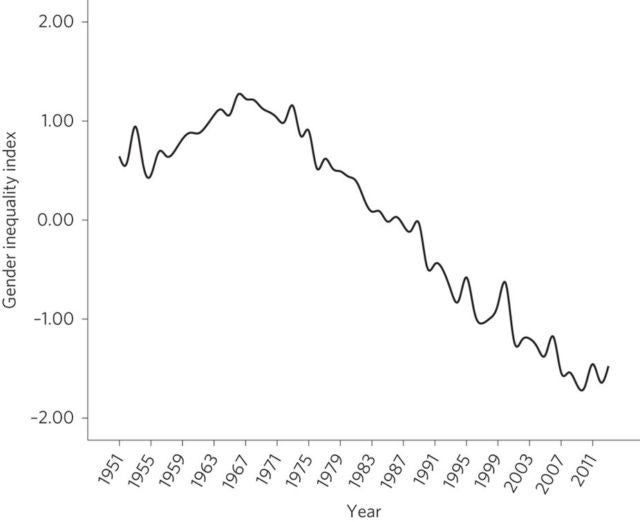As levels of infectious diseases rise, men and women change their life strategies.

In the movie Children of Men, declining public health leads to extreme social inequality.
Levels of disease in the environment may be linked to gains in women's political power. That's the finding of two psychologists who pored over six decades of data, looking at connections between ecological stressors and gender equality. Arizona State - Tempe's Michael E. W. Varnum and University of Waterloo, Canada's Igor Grossmann found that declining infectious disease rates in the US were strongly correlated with a rise in gender equality. The big question is why. Writing in Nature Human Behavior, the researchers say the trend can be partly explained by looking at how pathogens "cue people to adopt faster life strategies."
Varnum and Grossman's study was inspired by the field of behavioural ecology, where scientists explore how the physical environment affects animal behaviour. Obviously, social equality among humans is affected by political events such as the passage of Title IX and anti-discrimination laws. But the researchers were curious about whether environmental factors might also have an impact on whether we build societies that are more egalitarian or more authoritarian. To get an answer, Varnum and Grossmann narrowed their focus to looking strictly at gender equality between the years 1951 and 2013 in the US and the UK. They explain that they created "an index of gender equality using data on indicators of political representation (the number of women in Congress), wage inequality (male:female wage ratio based on data from the US Women’s Bureau and the National Committee on Equal Pay), linguistic representation in cultural products (use of male versus female pronouns in published books) and sexist work attitudes (percentage of respondents in Gallup polls preferring a male boss)."

The decline in gender inequality was preceded by lower levels of infectious disease in the US and the UK.
Life history strategies
There are a few possible reasons why pathogen levels might be leading indicators of gender equality in years to come. First, write the authors, it may simply be that gender inequality is a natural outgrowth of other social shifts caused by disease outbreaks:
"Higher levels of infectious disease seem to lead societies and individuals to adopt more traditional attitudes and norms. Higher levels of pathogen prevalence are associated with more conformity, more authoritarianism, less openness and tighter social norms. Given that most human societies have relatively patriarchal traditions, it seems possible that higher pathogen prevalence might also promote behaviours, norms and values that foster gender inequality.
But, Varnum told Ars by phone, the answer is more complicated than that. To explain it, he and Grossmann borrowed another idea from behavioural ecology called "life history strategy," or how animals plan their lives based on the environment, whether instinctually or rationally. Varnum confessed that the word "strategy" is "kind of a misnomer" because mostly this response has been studied in salamanders, who are not known for making rational or intellectual choices. "We're agnostic about whether humans are making rational decisions or having instinctual responses," Varnum said. But "if people around you are getting sick and dying young, it might cue a psychological or even physiological change to adapt to reproduce earlier." In their paper, he and Grossmann note that "a recent study found that people who perceived themselves as more vulnerable to disease show more impulsivity, greater delay discounting and a reduced ability to delay gratification." Another study "found that teen birth rates are higher in US states with higher levels of pathogen prevalence." In other words, if you think you might die young from disease, you might have babies at a younger age.
So how does this all affect gender equality? Varnum and Grossmann write:
"Because earlier mating reduces the ability to pursue education, career and status, women may be less likely to seek or attain positions of economic, social and political power in times where infectious disease is more prevalent. Conversely, when levels of infectious disease are low, people are more likely to adopt slower life history strategies. For women, this might mean delaying reproduction in favour of pursuing education and careers, thus, one might expect gender inequality to decrease with pathogen levels.
Right now in the US and the UK, we're seeing a long-term decline in gender inequality. Women are achieving political and economic status in ways they never did 60 years ago. If you look at Varnum and Grossmann's graph of declining gender inequality, it lines up nicely with an uptick in public health. Varnum told Ars that "we're looking at declines in those diseases due to vaccinations and greater access to health care, plus better sanitation and drinking water. The improvements continue over time, which is part of the reason for the decline in disease." He added that their findings offer "some interesting implications when you think about what NGOs and governments are doing with disease eradication and public health benefits. They may promote equality."
The flip side is that rolling back vaccine access and not providing communities with good drinking water could have the opposite effect. It will take 15 years to see the results, but declines in public health could be leading indicators that a society is about to become more authoritarian.